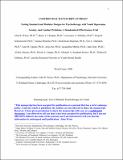| dc.contributor.author | Weisz, John R | |
| dc.contributor.author | Chorpita, Bruce F. | |
| dc.contributor.author | Palinkas, Lawrence A. | |
| dc.contributor.author | Schoenwald, Sonia K. | |
| dc.contributor.author | Miranda, Jeanne | |
| dc.contributor.author | Bearman, Sarah K | |
| dc.contributor.author | Daleiden, Eric L. | |
| dc.contributor.author | Ugueto, Ana Maria | |
| dc.contributor.author | Ho, Anya | |
| dc.contributor.author | Martin, Jacqueline Lee | |
| dc.contributor.author | Gray, Jane | |
| dc.contributor.author | Alleyne, Alisha | |
| dc.contributor.author | Langer, David | |
| dc.contributor.author | Southam-Gerow, Michael A. | |
| dc.contributor.author | Gibbons, Robert D. | |
| dc.date.accessioned | 2017-10-19T18:00:05Z | |
| dc.date.issued | 2012 | |
| dc.identifier.citation | Weisz, John R., Bruce F. Chorpita, Lawrence A. Palinkas, Sonja K. Schoenwald, Jeanne Miranda, Sarah Kate Bearman, Eric L. Daleiden, Ana M. Ugueto, Anya Ho, Jacqueline Martin, Jane Gray, Alisha Alleyne, David A. Langer, Michael A. Southam-Gerow, Robert D. Gibbons, and the Research Network on Youth Mental Health. 2012. “Testing Standard and Modular Designs for Psychotherapy Treating Depression, Anxiety, and Conduct Problems in Youth.” Archives of General Psychiatry 69, no. 3: 274-282. doi:10.1001/archgenpsychiatry.2011.147 | en_US |
| dc.identifier.issn | 0003-990X | en_US |
| dc.identifier.uri | http://nrs.harvard.edu/urn-3:HUL.InstRepos:34262171 | |
| dc.description.abstract | CONTEXT:
Decades of randomized controlled trials have produced separate evidence-based treatments for depression, anxiety, and conduct problems in youth, but these treatments are not often used in clinical practice, and they produce mixed results in trials with the comorbid, complex youths seen in practice. An integrative, modular redesign may help.
OBJECTIVE:
Standard/separate and modular/integrated arrangements of evidence-based treatments for depression, anxiety, and conduct problems in youth were compared with usual care treatment, with the modular design permitting a multidisorder focus and a flexible application of treatment procedures.
DESIGN:
Randomized effectiveness trial.
SETTING:
Ten outpatient clinical service organizations in Massachusetts and Hawaii.
PARTICIPANTS:
A total of 84 community clinicians were randomly assigned to 1 of 3 conditions for the treatment of 174 clinically referred youths who were 7 to 13 years of age (70% of these youths were boys, and 45% were white). The study was conducted during the period from January 12, 2005 to May 8, 2009.
INTERVENTIONS:
Standard manual treatment (59 youths [34% of the sample]; cognitive behavioral therapy for depression, cognitive behavioral therapy for anxiety, and behavioral parent training for conduct problems), modular treatment (62 youths [36%]; integrating the procedures of the 3 separate treatments), and usual care (53 youths [30%]).
MAIN OUTCOME MEASURES:
Outcomes were assessed using weekly youth and parent assessments. These assessments relied on a standardized Brief Problem Checklist and a patient-generated Top Problems Assessment (ie, the severity ratings on the problems that the youths and parents had identified as most important). We also conducted a standardized diagnostic assessment before and after treatment.
RESULTS:
Mixed effects regression analyses showed that modular treatment produced significantly steeper trajectories of improvement than usual care and standard treatment on multiple Brief Problem Checklist and Top Problems Assessment measures. Youths receiving modular treatment also had significantly fewer diagnoses than youths receiving usual care after treatment. In contrast, outcomes of standard manual treatment did not differ significantly from outcomes of usual care.
CONCLUSIONS:
The modular approach outperformed usual care and standard evidence-based treatments on multiple clinical outcome measures. The modular approach may be a promising way to build on the strengths of evidence-based treatments, improving their utility and effectiveness with referred youths in clinical practice settings. Trial Registration clinicaltrials.gov Identifier: NCT01178554. | en_US |
| dc.description.sponsorship | Psychology | en_US |
| dc.language.iso | en_US | en_US |
| dc.publisher | American Medical Association | en_US |
| dc.relation.isversionof | doi:10.1001/archgenpsychiatry.2011.147 | en_US |
| dash.license | OAP | |
| dc.title | Testing Standard and Modular Designs for Psychotherapy Treating Depression, Anxiety, and Conduct Problems in Youth | en_US |
| dc.type | Journal Article | en_US |
| dc.description.version | Accepted Manuscript | en_US |
| dc.relation.journal | Archives of General Psychiatry | en_US |
| dash.depositing.author | Weisz, John R | |
| dc.date.available | 2017-10-19T18:00:05Z | |
| dc.identifier.doi | 10.1001/archgenpsychiatry.2011.147 | * |
| dash.contributor.affiliated | Martin, Jacqueline | |
| dash.contributor.affiliated | Bearman, Sarah | |
| dash.contributor.affiliated | Langer, David Adam | |
| dash.contributor.affiliated | Ugueto, Ana | |
| dash.contributor.affiliated | Weisz, John | |


